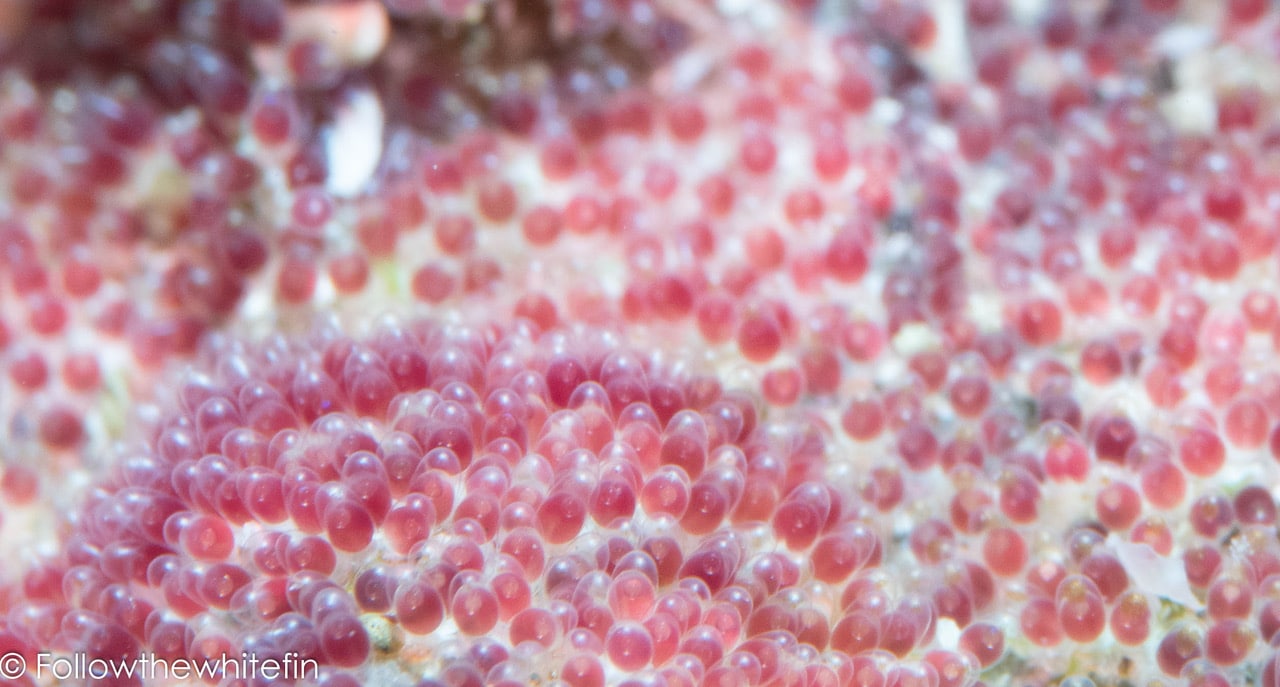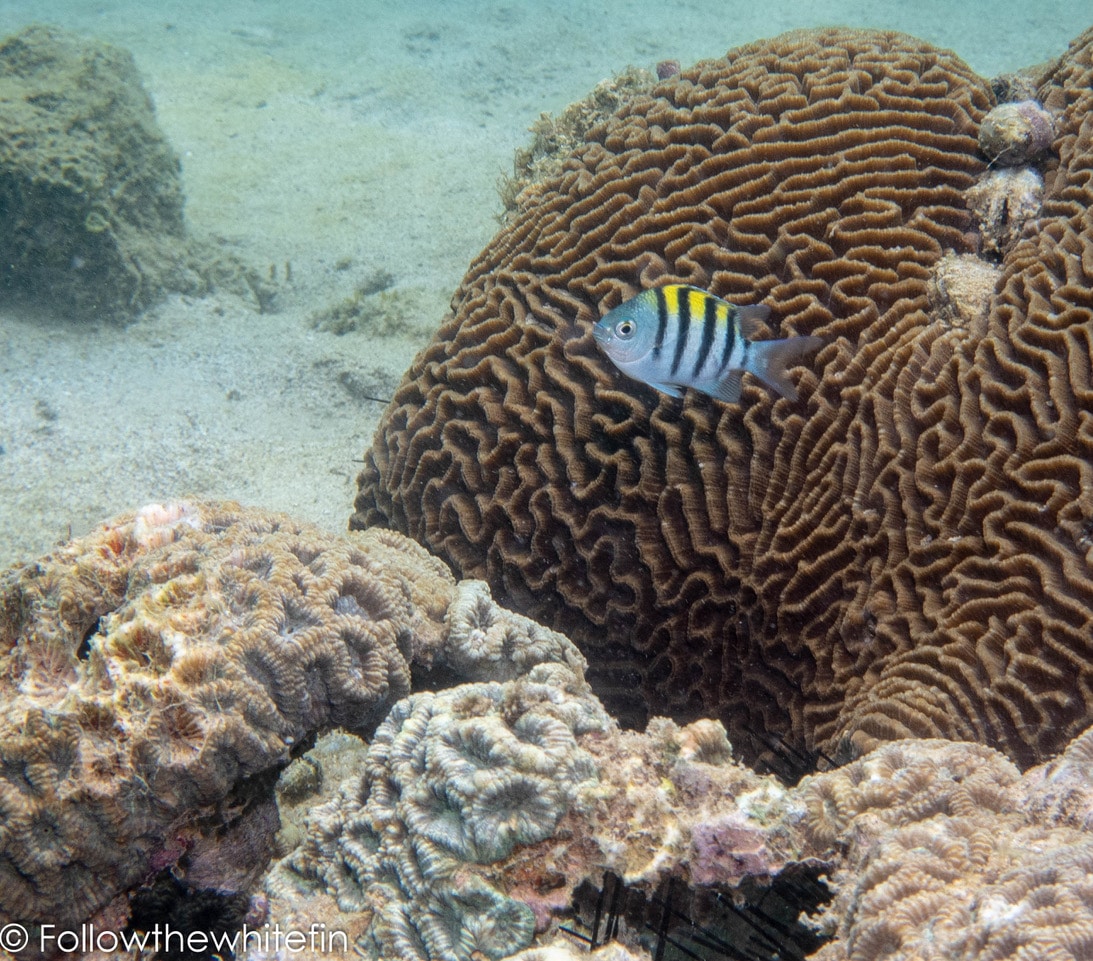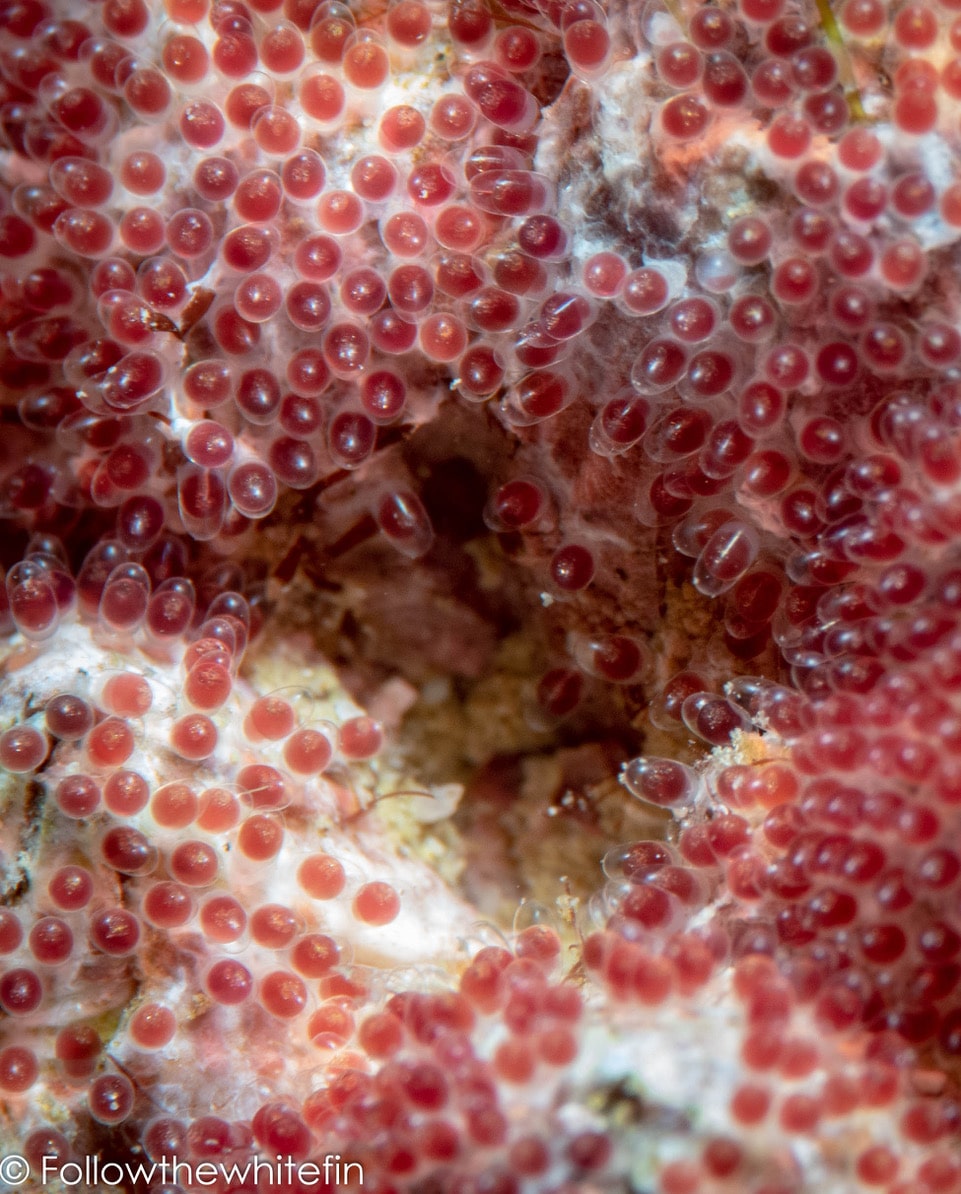Marine Life & Conservation
The Sergeant Major Fish: Underdog to Super-Dad

You’re on a dive, minding your own business when suddenly, your mask is being bombarded by a frantic and extremely angry creature. In shock you reverse, exiting the firing line when you realise that the monster in question is none other than the Sergeant Major Fish.
If your biggest fear in the ocean is the ‘dreaded shark’, think again, it’s the Sergeant Major you really have to worry about!! In disbelief you take a second glance and notice that the creatures you once thought were small and peaceful are all behaving in this manner to anything crossing or invading their path.
Why do they behave like this? And why have you never noticed this before?
Background Check
Abudefduf is from the Arabic; abu “the one with”, def “side”, and duf “prominent”. Its name, referring to the vertical black bars on its side, roughly translating to “the one with prominent sides”. This is also where its gets its common name “Sergeant Major,” as the stripes resemble the bars on a military uniform. Despite the general common name Sergeant Major there are up to 20 species of this damselfish, part of the family Pomacentridae, that you can be found worldwide. Generally, their bodies are deep, oval and compressed with a continuous dorsal fin and a forked caudal fin, but each species varies in size and the number of dorsal fins, dorsal soft rays, anal spines and anal soft rays.
Meet the Locals
Here in the UAE we have the Indo-pacific Sergeant Abudefduf vaigiensis. Widely distributed throughout the Indo-Pacific: Red Sea, Indian Ocean to eastern Africa, north to southern Japan, and south to Australia. In 1991, it was even discovered in the Hawaiian Islands, possibly floating marine debris such as abandoned fishing nets, where it now coexists with the Hawaiian Sergeant Abudefduf abdominalis. They form large aggregations while feeding during the day and play hide and seek by themselves at night on coral reefs, tidal pools and rocky reefs at depths between 1 to 15 m. The Indo-pacific Sergeant can grow up to 20 centimetres long, feeding on zooplankton, benthic algae and small invertebrates.
The Interesting Part!
So now you have the Sergeant Major’s background check. Here’s the fascinating part!
Between March and August, the Sergeant Majors congregate in large numbers to reproduce. To start the process, the males prepare temporary nesting sites by coating patches of rocks, shipwrecks and corals with an adhesive substrate. The females then wander around looking for that special partner to mate with. When a female is near, the male will try to attract the female by preforming a unique and intriguing dance which involves moving up and down erratically, like the local dance club. If she’s digging his moves she will deposit up to 20,000 eggs. Once the eggs have dispersed, they attach themselves to the substrate the males prepared and will then be fertilized.
After all the fun, the females eventually take off leaving the males with all the responsibility of protecting his little patch. The male is extremely attentive by continuously aerating his eggs stopping fungus build up. He will also turn a darker bluish colour which most likely acts as a warning colour to predators or even possible camouflage. Any fish that comes too close are aggressively chased away and divers are left in bewilderment.
The eggs start as solid red ovals around 0.5-0.9mm. Once they are fertilised they start to turn a green colour with a deep red yolk leaving the surfaces as a patchwork. After 4-5 days the eggs will hatch an hour after sunset. If you are able to see the hatching, it can be amazing to watching as they wiggle out from the substrate and break free. Once hatched they are around 2.4mm in size and set off to tackle the big blue ocean.
I have been very privileged over the last few weeks to witness parts of this process and they are amazing to watch. The reef has literally been covered in patches of varying shades of red and green. The determination of the male Sergeant Major whilst hilarious to watch is also impressing for such a small creature to display. With my new camera I was able to catch some of these processes, but my next goal is to capture the courtship ritual and hatching (I may need a bigger camera though).
Next time you are out diving, make sure you don’t overlook the little guys, and look out for the patchwork of the ocean created by the Sergeant Major Fish.
Find out more about Kayleigh at www.followthewhitefin.com
Marine Life & Conservation
Double Bubble for Basking Sharks

 The Shark Trust is excited to announce that, for two more days only, all donations, large or small, will be doubled in the Big Give Green Match Fund!
The Shark Trust is excited to announce that, for two more days only, all donations, large or small, will be doubled in the Big Give Green Match Fund!
Donate to Basking in Nature: Sighting Giants
The Shark Trust is hoping to raise £10k which will be doubled to £20k. This will go towards Basking in Nature: Sighting Giants. And they need YOUR help to reach they’re goal.
The Shark Trust’s citizen science project is to monitor and assess basking sharks through sightings; encouraging data collection, community engagement, and promoting nature accessibility. This initiative aims to enhance health and wellbeing by fostering a deeper connection with British Sharks.
Campaign Aims
- Increase citizen science reporting of Basking Sharks and other shark sightings to help inform shark and ray conservation.
- Provide educational talks about the diverse range of sharks and rays in British waters and accessible identification guides!
- Create engaging and fun information panels on how to ID the amazing sharks and rays we have on our doorstep! These can be used on coastal paths around the Southwest. With activities and information on how you can make a difference for sharks and rays!
- Promote mental wellbeing through increasing time in nature and discovering the wonders beneath the waves!
Donate, and double your impact. Click Here
Marine Life & Conservation
Leading UK-based shark conservation charity, the Shark Trust, is delighted to announce tour operator Diverse Travel as a Corporate Patron

 Corporate Patrons provide a valuable boost to the work of The Shark Trust. The Trust team works globally to safeguard the future of sharks, and their close cousins, the skates and rays, engaging with a global network of scientists, policymakers, conservation professionals, businesses and supporters to further shark conservation.
Corporate Patrons provide a valuable boost to the work of The Shark Trust. The Trust team works globally to safeguard the future of sharks, and their close cousins, the skates and rays, engaging with a global network of scientists, policymakers, conservation professionals, businesses and supporters to further shark conservation.
Specialist tour operator Diverse Travel has operated since 2014 and is committed to offering its guests high quality, sustainable scuba diving holidays worldwide. Working together with the Shark Trust will enable both organisations to widen engagement and encourage divers and snorkellers to actively get involved in shark conservation.
“Sharks are truly at the heart of every diver and at Diverse Travel, we absolutely share that passion. There is nothing like seeing a shark in the wild – it’s a moment that stays with you forever!” says Holly Bredin, Sales & Marketing Manager, Diverse Travel.
“We’re delighted to celebrate our 10th year of business by becoming a Corporate Patron of the Shark Trust. This is an exciting partnership for Diverse and our guests. We will be donating on behalf of every person who books a holiday with us to contribute towards their vital shark conservation initiatives around the world. We will also be working together with the Trust to inspire divers, snorkellers and other travellers to take an active role – at home and abroad – in citizen science projects and other activities.”
Paul Cox, CEO of The Shark Trust, said:
“It’s an exciting partnership and we’re thrilled to be working with Diverse Travel to enable more divers and travellers to get involved with sharks and shark conservation. Sharks face considerable conservation challenges but, through collaboration and collective action, we can secure a brighter future for sharks and their ocean home. This new partnership takes us one more valuable step towards that goal.”
For more information about the Shark Trust visit their website here.
For more about Diverse Travel click here.
-

 News3 months ago
News3 months agoHone your underwater photography skills with Alphamarine Photography at Red Sea Diving Safari in March
-

 News3 months ago
News3 months agoCapturing Critters in Lembeh Underwater Photography Workshop 2024: Event Roundup
-

 Marine Life & Conservation Blogs3 months ago
Marine Life & Conservation Blogs3 months agoCreature Feature: Swell Sharks
-

 Blogs2 months ago
Blogs2 months agoMurex Resorts: Passport to Paradise!
-

 Blogs2 months ago
Blogs2 months agoDiver Discovering Whale Skeletons Beneath Ice Judged World’s Best Underwater Photograph
-

 Gear Reviews2 weeks ago
Gear Reviews2 weeks agoGEAR REVIEW – Revolutionising Diving Comfort: The Sharkskin T2 Chillproof Suit
-

 Marine Life & Conservation2 months ago
Marine Life & Conservation2 months agoSave the Manatee Club launches brand new webcams at Silver Springs State Park, Florida
-

 Gear Reviews3 months ago
Gear Reviews3 months agoGear Review: Oceanic+ Dive Housing for iPhone









